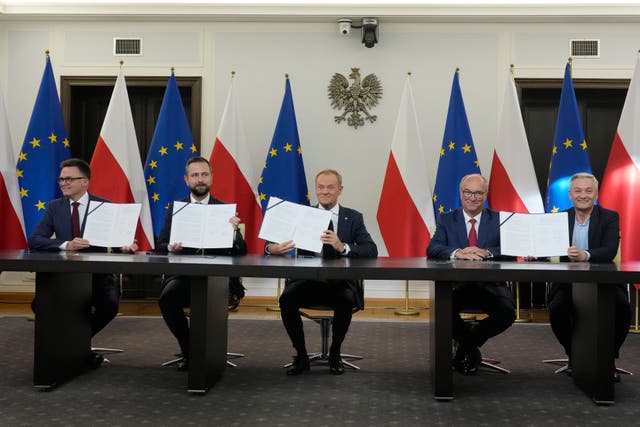
Iain Dale 7pm - 10pm
10 November 2023, 15:24

Their candidate to be the next prime minister is Donald Tusk, a former prime minister who leads the largest of the parties.
The leaders of the Polish opposition parties that together won the most votes in last month’s election signed a coalition agreement on Friday that vows to restore the nation’s legal order and strengthen its security in light of Russian aggression against neighbouring Ukraine.
The parties collectively won the October 15 vote, but still will not have an immediate chance to try to form a government.
The current governing Law and Justice party received more votes than any other single party but less than a majority.
It will get the first chance to form a government — something widely viewed as doomed to fail.

The opposition groups called themselves the “democratic opposition” as they ran on separate party lists but vowed to co-operate to restore democracy after eight years of rule by Law and Justice, which has been accused of eroding the rule of law.
Their candidate to be the next prime minister is Donald Tusk, a former prime minister who leads the largest of the opposition parties, the centrist and pro-European Union group Civic Coalition.
Mr Tusk, also a former top leader of the European Union, said the coalition agreement offers “signposts and recommendations for our work”.
The agreement cites “the unprecedented threat to our security caused by Russian aggression against Ukraine” and pledges to strengthen Poland’s international position, including in the EU and Nato.
“We will consistently uphold Polish interests by conducting a clear and calculable foreign policy that is intelligible to friends and deterrent to the enemies of our country,” the document said.
That was a clear rebuke of the sometimes combative tone taken by Law and Justice with foreign partners, even allies such as Germany and Ukraine.
Law and Justice, a right-wing populist party, won 194 seats in the 460-seat lower house of parliament, while the parties that signed the agreement together have a comfortable majority of 248.
Law and Justice has no potential coalition partner, not even in the far-right Confederation.
President Andrzej Duda nonetheless gave Prime Minister Mateusz Morawiecki of Law and Justice a first chance to try to form a government.
Commentators believe Duda tapped him to show loyalty to Law and Justice, the party he is allied with.
“Things are going in the right direction,” Tusk said at the signing ceremony.
“Regardless of the decisions that are on the side of President Andrzej Duda, we are ready to take responsibility for our homeland and for the coming years.”
The coalition represents a broad alliance of parties with sometimes conflicting views. One key issue where they do not agree is abortion, a highly divisive issue in a traditionally Catholic country undergoing rapid secularisation.
The abortion law was restricted under Law and Justice and a near total ban is now in place.
Mr Tusk’s Civic Coalition is an electoral alliance of four parties led by his centrist Civic Platform party which also includes the Greens.
“Today we are sending an important signal to Europe and the world,” said New Left co-chairman Robert Biedron. “Poland is returning to the democratic, law-abiding map of Europe and the world that respects human rights.”
His fellow co-chair, Wlodzimierz Czarzasty, acknowledged that the coalition agreement would require a lot of compromise and that his group would not get everything it wants. Still, he expressed satisfaction that the left appeared poised to return to government for the first time in 18 years.